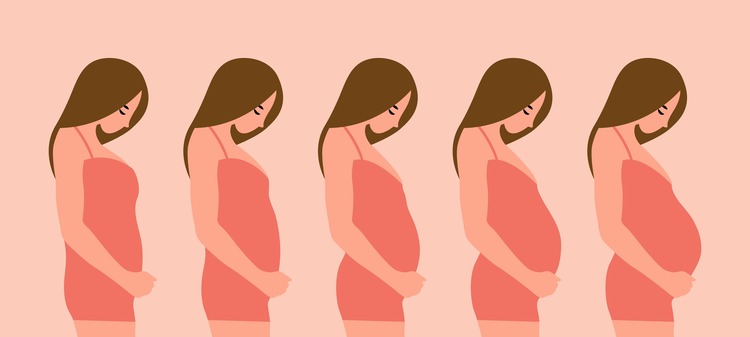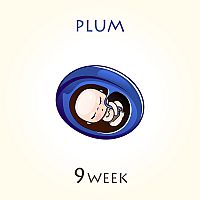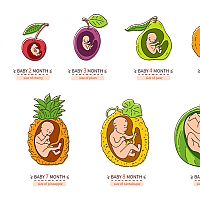
9th week of pregnancy - symptoms, belly size, ultrasound and fetal size
Your pregnancy has just reached the 3rd month. You won't even know it and in six months you will already have your desired baby in your arms. Hormone levels are peaking and many women who have experienced only mild symptoms may now be experiencing their peak. Symptoms that were not present until now may also appear. The embryo in the womb continues to grow and its brain develops significantly, the digestive system gradually develops and the intestines move from the umbilical cord to the stomach, which is being formed. The external genitalia are not yet visible, but the internal testicles and ovaries will soon be the distinguishing mark for sex. The frequency of heartbeats decreases and the forming placenta is slowly starting to prepare for its tasks.
There is a lot going on in a woman's body. Day by day, the embryo takes on contours and begins to resemble a person more and more. Although in size it is still the equivalent of an olive or a peanut. The growth of the head slows down slightly and the body begins to take shape more and more. In addition to the embryo - fetus, your uterus has also grown considerably. It is already the size of a larger orange. In most women's breasts in this phase are extremely sensitive, blood-filled, full, and veins or Montgomery's glands have also appeared on them. What hormones control processes in a woman's body? How does a baby develop in the womb? Which symptoms are most prominent in the 9th week of pregnancy?
The development of the baby in the 9th week of pregnancy - the embryo is changing
Your offspring is still in the embryonic phase, although by default we already talk about it as a fetus or a baby. The head is still the most prominent, but its growth is slowing down. Primarily, it will be possible to observe changes on the body of the embryo for the next few weeks. His face is taking shape. The ears are already clearly visible (note that the inner ear is forming, but the embryo still cannot hear), the eyes covered with lids, the nose and also the tongue. Lips, jaw and palate are even created. The digestive system continues to develop, the stomach can already start producing stomach acids, and the intestines move from the umbilical cord into the abdominal cavity. The pancreas and bile ducts also develop. The kidneys themselves can already create urine and the liver blood cells.
The heart is divided into two chambers and produces a frequency of 130 to 150 beats per minute. The circulatory system is also being improved, which again works a little more perfectly. The brain has already formed millions of neural connections and communicates with other organs. Reproductive organs (ovary or testicles) are forming, but sex cannot yet be distinguished. The typical tail, which transforms into a dorsal part, has already slowly disappeared, and that is why the embryo turns into a "little baby" to the eye. The development of the anus also begins. Significant progress has been noted in the development of the placenta, which is not yet able to perform all its functions, but with the transition to the second trimester, it will already take on key roles.
9th week of pregnancy – fetal size and sono
An embryo or, if you prefer, a fetus or a baby, at this stage of development is about the size of a peanut, or olive. During the 9th week, it can measure 23 to 40 mm (2.3-4 cm). The weight is already moving, which can be around 2 to 3 grams. The head is the most developed compared to the rest of the body. Although it is not very visible, blood vessels are forming under the thin layer of skin. During development, the skeleton and ribs also adapt to the growing diaphragm, which will separate the abdominal part from the chest part. On the limbs it is possible to see clearly separated fingers. It's not about flippers anymore. The arms slowly bend at the elbows and wrists, and the bends in the knees or ankles can already be distinguished on the legs.
On sonae, the movements of the embryo can be observed, which are reflexive and spontaneous. He mostly moves his legs (kicks) and does somersaults. In this way, the development of the muscles is stimulated and the body is straightened by changing the position. Until now, the baby in the amniotic sac was lying in the typical C position. Although the ultrasound will detect these movements, the woman will not feel them.
If you have an appointment for an initial examination with a gynecologist, the most important thing is to confirm the pregnancy. Some do it with a transvaginal probe, others decide in the 9th week of pregnancy for an ultrasonographic examination. If the doctor confirms the pregnancy, it goes into the clinical phase. During the USG, the doctor will monitor the location of the embryo and their possible number (multiple pregnancy), the position of the placenta, and it is also possible to observe the activity of the fetus.
The parietal-coccygeal distance (CRL) will be determined in order to determine the stage of pregnancy and the expected date of birth. The doctor will continuously refine it. Complete laboratory blood and urine samples are waiting for you. Blood group and RH factor, protein concentration in urine and the presence of antibodies to certain diseases are determined. Pressure, weight, height are measured and the doctor finds out your health status, family history, possible diseases, disorders, asks you about symptoms, medications you take, feelings and much more. A pregnancy book will be created for you, where you will also have another consultation appointment.
Pregnancy hormones
Hormonal changes are the most important in this whole process. It is mainly the hormones that ensure that the pregnancy, even in this most vulnerable phase, will go well and be maintained. Each of the hormones fulfills its specific function and at the same time they work together. Around the beginning of the 3rd month of pregnancy, i.e. in the 9th trimester, many hormones reach their peak levels, which is often reflected in the intensity of the symptoms. Which hormones are these?
- hCG - human chorionic gonadotropin is probably the most well-known pregnancy hormone. In the period from the 9th to the 12th week of pregnancy, its level peaks and is at the level of approximately 25,700-288,000 MIU/ml. Its rising level is already observable at the beginning of pregnancy and represents an authoritative figure. Its functions are used to maintain the pregnancy in the woman's body. It also supports the development of the corpus luteum, which produces other hormones.
- Estrogen - increases the volume of blood in the mother's body during pregnancy and at the same time affects the proper functioning of the uterus. It is excreted by the corpus luteum. Its concentration plays an important role in the development of the fetus, systems, organ growth and supports the production of milk.
- Progesterone – is also produced by the corpus luteum, supports placental activity, relaxes muscles and blood vessels. It affects premature contractions of the uterus. It affects blood pressure. Its activity can sometimes cause nausea, dizziness or heartburn.
- Cortisol - is produced in the adrenal glands and is also referred to as a stress hormone. It mobilizes important nutrients in the body - carbohydrates, fats, amino acids.
- Relaxin – takes care of the relaxation of ligaments and tissues, for example during the growth of the uterus. It also relaxes the arteries so that blood can flow more efficiently in the woman's body.
- Insulin - ensures that glucose enters the cell and is converted into energy. Its level is important not only for the functioning of the mother's organism, but also for the child's. Thanks to its presence, nutrients have the opportunity to flow to the baby and thus support its growth.
- Prolactin – supports milk production and the activity of the mammary glands.
- HCS – growth hormone supporting the healthy development of the baby.
Belly size and onset of symptoms - 9th week of pregnancy
What feelings should a woman have in the 9th week of pregnancy? It is impossible to speak objectively for all women, because the course of pregnancy is a very individual matter from the beginning to the end. Despite this, the uterus grows and grows in the 9th week of pregnancy, you will not have a belly typical of pregnant women. Do not be confused by intestinal peristalsis or flatulence. However, it is possible that your weight has increased a little and your waistline has thickened. It still probably won't be a reason to change your wardrobe. On the contrary, you may have lost weight due to intense nausea.
Your breasts suddenly enlarge, veins, stretch marks or so-called Montgomery's glands. These are small white dots whose task is to produce sebum and moisturize the nipples so that they are ready for breastfeeding the baby.
After blood sampling at the doctor, you may be surprised by the symptoms of anemia, i.e. anemia. This is caused by an increased volume of blood in the body and a lack of red blood cells (or hemoglobin). The solution is to increase the intake of iron in the diet and in the form of vitamin supplements. Mood swings, exhaustion, nausea, headaches, dizziness, metallic taste in the mouth, frequent urination or heartburn are usually present. The production of milky vaginal discharge - leucorrhoea - also increases. This discharge has a defensive nature and is maintained in the cervix, creating a mucus plug. It protects the uterus and the fetus from infections and inflammations. In some women, the symptoms are more intense in this phase, but in others, on the contrary, they weaken.

Pregnancy cold and severe nausea
Less frequent but occurring symptoms of pregnancy in this period also include the common cold of pregnancy. It is typically manifested by a stuffy nose and swelling of the mucous membrane. It is during this period that many women experience extreme nausea. Standard nausea and vomiting occurs in 80-90% of pregnant women. More intense or milder manifestations can last until the 20th week. Extreme nausea, so-called hyperemesis gravidarum, appear in 2% of women. It is all-day nausea and vomiting. Such a state is very unpleasant, because a woman cannot concentrate on anything. In some cases, there is a risk of dehydration and an infusion is necessary to supply the body and the fetus with nutrients.
Pain in the lower abdomen and unpleasant acne
Cramps or pain in the lower abdomen in the 9th week of pregnancy can be caused by constipation, flatulence, flatulence or intestinal peristalsis in general. Due to hormonal changes, digestion is slowed down and this can cause bloating in the long term. The reason can also be the growing uterus, the ligaments of which are sometimes stretched and during pregnancy this can cause cramps in the lower abdomen. Be careful if pain in the lower abdomen is accompanied by bleeding, lower back pain or vomiting. It could be a miscarriage. Many women may experience pregnancy spots. Some expectant mothers have ugly acne and oily skin.
9th week of pregnancy - experiences
In Internet discussions and forums, mothers most often deal with their feelings and symptoms in the 9th week of pregnancy. Several women stated that they felt as if they were not even pregnant. They did not experience any significant symptoms or problems. Other discussants responded that this is fine and the symptoms will appear later and may not be as intense at all. Other women encounter really strong nausea, vomiting and heartburn. Expectant mothers often also suffer from stomach problems, i.e. problematic digestion. In the discussion, women solve situations when the symptoms have a disappearing character. However, the loss of intensity of some symptoms or their complete disappearance is normal. Women also discussed the topic of the first visit to the gynecologist. For some, the 9th trimester seemed too late, others argued that if the woman has no problems, there is no reason to worry about such a deadline, while some also completed the entrance examination in the 10th or 12th trimester.
The most frequent questions - FAQ
Did or do you suffer from unpleasant nausea during the 9th week of pregnancy? What other symptoms did you have in the 9th week of pregnancy? Have you already completed your first pregnancy examination at a gynecologist? Have you already gained weight at this stage? We are interested in your opinion. Your experiences, advice, tips, recommendations related to the course of pregnancy in the 9th week are a source of quality information. We will be happy if you share them in the discussion under this article. Other readers or expectant mothers will be happy to read your story and find answers to their questions in it. If you have additional questions, do not hesitate to leave a comment under the article.
What if I have pain in the lower abdomen in the 9th week of pregnancy?
Is it possible to be symptom-free in the 9th week of pregnancy?
9th week of pregnancy, what month is it?
Gallery
Pridať komentár








